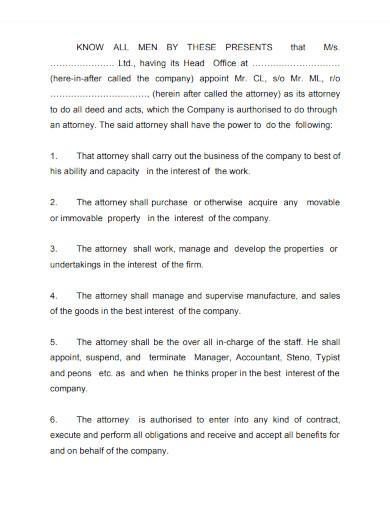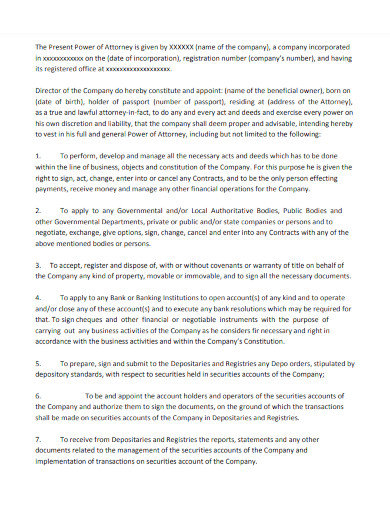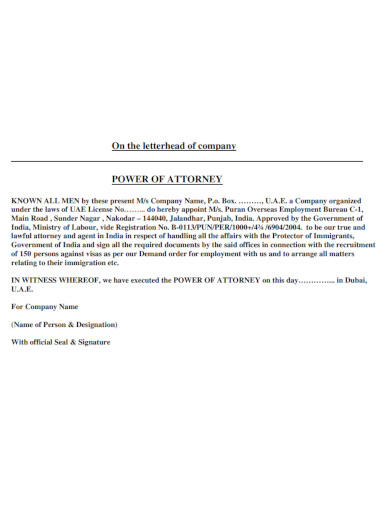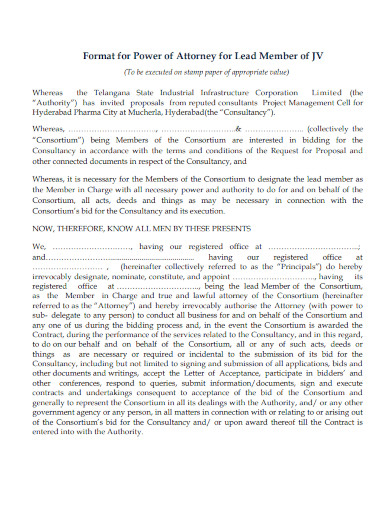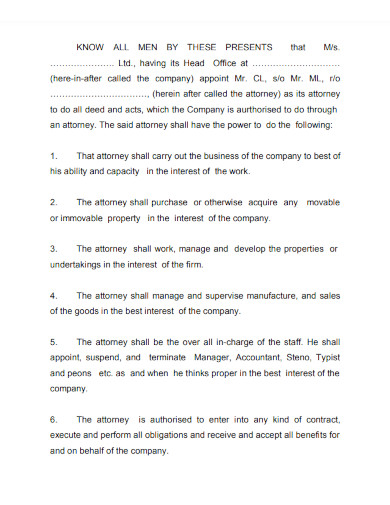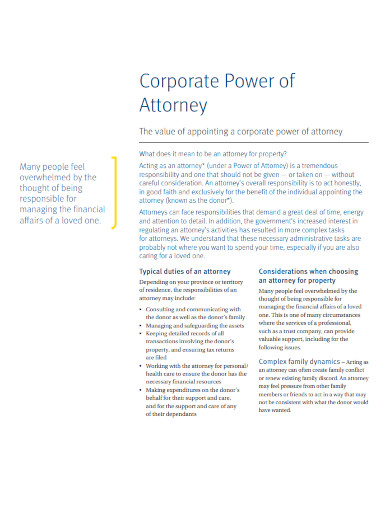The board of directors of a firm is often in charge of making decisions. But what if a director or shareholder loses his or her mental competence and ability to decide? Powers of attorney are legal documents that allow one party to authorize another to act on their behalf in a specific set of legal or financial conditions. Many people are familiar with Lasting Powers of Attorney (LPAs), which are created to enable close family members or friends to act on behalf of someone who has lost mental ability in matters of health and finances. Powers of attorney have a much broader scope and can be used for a variety of corporate objectives.
6+ Company Power of Attorney Samples
A company power of attorney is a legal documentation that allows a person to conduct and sign an agreement on the company’s behalf. This person is known as a “attorney.” A company power of attorney might allow the attorney to sign any documents that are mentioned in the document. This could be specific types of documents or any materials that the attorney determines. A firm has the legal capacity of a legal person and functions through its directors, according to the law. This means that a corporation can engage into contracts in the same way that an individual can. On behalf of the corporation, directors sign documents and make choices. The company’s board require the person to function as the attorney in a company power of attorney.
1. Company General Power of Attorney
2. Company Power of Attorney Example
3. Ltterhead of Company Power of Attorney
4. Company Power of Attorney for Lead Member
5. Company Power of Attorney Agreement
6. Corporate Company Power of Attorney
7. Power of attorney for Annual Company Meeting
The most probable explanation for a company to issue a power of attorney is when one or more of the company’s directors is absent to sign papers on its behalf. For instance, if the director is unavailable to contact due to vacation or business, the company may be unable to implement documents that require the director’s signature.
In a small or beginning business, a company power of attorney might be especially useful. In organizations with only one director, for example, if that director goes out of touch or loses the ability to sign important files, the company will grind to a halt if no one else is authorized to sign off on checks or other important documents that affect cash flow. Corporation legislation requires two directors or a director and a secretary of the company to sign documents for firms with two directors. This means that if one of the business’s directors is unable or unwilling to sign a document or enter into a contract, the business would be unable to do so. This situation can be solved with a power of attorney.
To award a corporate power of attorney, the firm’s articles of incorporation (and any related shareholders agreement) must be evaluated to determine that there is permission to do so and that no constraints will prohibit them from being granted.
The articles of incorporation may contain the ability to give a corporate power of attorney. A firm may be able to depend on a statutory right if the publications do not allow for it. However, the statutory right applies only in certain instances and does not include issuing a power of attorney on behalf of a single director. As a result, it’s crucial to guarantee your company’s articles of incorporation are up to date and that you have a plan in place to deal with a situation like this.
FAQs
Can a company lawfully appoint an attorney?
Corporations law, both in Australia and abroad, gives companies the legal capacity and powers of an individual. As a result, a corporation has the authority to choose an attorney or agent on its own terms. An attorney or agent might be a corporation or an individual.
Who to appoint as company attorney?
You should select the correct individual or people to serve as your company’s attorney with caution. You’ll also need to figure out how long the attorney will be on the job and what powers they’ll have. A company power of attorney should always be well documented when delegating authority to someone who does not have it otherwise. Furthermore, you should constantly make the attorney aware of the limits of their authority so that they are aware of what they can and cannot do. This should reduce the chances of the attorney operating without authorization.
A company power of attorney is a legal form that authorizes another individual (the attorney) to act on the firm’s behalf. It is significant because it empowers another individual to carry out company activities. This is critical in cases where the firm (via its directors) is unable to act. Choosing an attorney for your business is a big decision. You should think about who you want to designate as an attorney and ensure the appointment is properly documented.
Related Posts
FREE 6+ Special Power of Attorney Samples in PDF
FREE 5+ Business Power of Attorney Samples in PDF
FREE 10+ Health Care Power of Attorney Samples in PDF | MS Word | Google Docs
FREE 5+ Affidavit of Desistance Samples [ Case, Settlement, Claim ]
FREE 10+ Affidavit of Funeral Expenses Samples [ Claim, Cost, Benefits ]
FREE 6+ Affidavit of Translation Samples in PDF
FREE 2+ Supporting Deposition Samples in PDF | MS Word
FREE 9+ Sample Orders to Appear in PDF
FREE 5+ Mortgage Deed Samples & Templates in PDF
FREE 13+ General Power of Attorney Templates in PDF | MS Word
FREE 19+ General Affidavit Samples and Templates in PDF
FREE 9+ Patent Assignment Samples and Templates in PDF
FREE 14+ Deed of Discharge Samples & Templates in PDF | MS Word
FREE Buying & Selling Intellectual Property [ Definition, Types, Facts ]
FREE Application for a License to Display Trademarks [ Definition, When is it Needed, How to Apply ]

